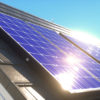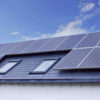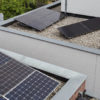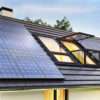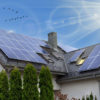Most solar panels out there come with a service life of around 25 to 30 years. But, have you wondered what happens with them after that? Do you simply get them replaced? If so, where will they end up?
Unlike other consumer products, a solar panel’s life cycle is a bit more complicated. It is important to understand what you can expect from your solar panels when they start nearing their expiration date so that you make the best decision possible.
So, How Long Do Solar Panels Really Last?
Solar panels do not simply stop working when they turn 25 or 30. Rather, the time period stated by most manufacturers usually means that the panels will produce a certain amount of power of their original output for a period of time.
For example, let’s say the solar panels from Sunny Side Up Solar have a lifespan of 25 years. The panels also have a degradation rate of 0.5% per year, so, in 25 years, they will be producing 87.5% of their original output. Acme Solar will offer a performance guarantee of 80%-85% for the rated life span.
But, the key question here remains, do you really need to throw the panels after 25 years? Not necessarily, there are plenty of panels from the 1980s that are still working well even today.
If we take the 0.5% degradation rate, the panels will reach 50% output in a century! Admittedly, no one will wait that long, but the point here is that solar panels can remain perfectly functional well after their manufacturer-claimed service life.
It gets more complicated when a panel is Tier 1 but despite the datasheets they fail well inside the warranted period. There are many factors adding to under performance, so seek out good independent advice. It should be no surprise to learn that low quality panels under perform or fail outright within the first three to five years.
How to Tell When It’s Time to Replace Solar Panels
Whether you choose to leave your panels as is or have them changed depends on a couple of considerations. Firstly, as we stated above, there’s no real reason to change the panels. Provided you’re satisfied with their output, you can leave them as is.
On the other hand, there are strong incentives to switch as well. Since the panels would’ve paid themselves off by that time, you can go for newer models which may offer better output on a smaller footprint.
Even so, it may be hard to know when it’s time to get rid of old panels. Here are a few telltale signs your panels will begin to exhibit when their age begins to show:
Voltage and current fluctuations: Electrical fluctuations are usually the very first thing that homeowners notice when their panels are about to go kaput. That being said, fluctuations can be caused by a myriad of factors.
You may have erratic solar output due to cloud cover. The wiring or the inverter may be damaged. So, it’s best to have a qualified electrician check your installation before deciding the panels are the culprit, regardless of their age.
Cracks, burn marks and general degradation: Over time the age of your panels will begin to show. If you see films peeling off, dark patches or wear and tear, then they might be nearing the end of their lifecycle.
But, mere unsightliness isn’t enough to condemn a panel either, nor will it necessarily correlate with age. Some panels may begin to show damage signs earlier than others. If the power output of your panels seems to be dropping as they pick up more scars, you may want to consider replacing them.
Damage due to weather or severe events: The last two points covered reasons that may be hard to pinpoint. But, if your panels were hit by lightning or a barrage of hail that damaged them beyond repair, then they may need replacement too.
Any changes here will need to be made according to your warranty policy. If your installer covers weather damage, then it’s best to replace them. Else, you may have to shop for new panels.
Don’t Rush to Replace Your Panels
Ideally, your panels should be replaced only when there’s no other option left. However, most homeowners may not be able to tell whether the problems they’re facing are due to panel aging or fixable errors.
It’s best to have electricians take a look at your panels before making any decisions. You may be able to eke out a few more years of life out of your panels with some good maintenance practices and timely repairs.
As Australia’s premier solar search engine, bidmysolar™ specialises in helping homeowners get the best solar power systems that serve them far longer than advertised. Feel free to check out how we design solar power systems to ensure you get the best out possible.

